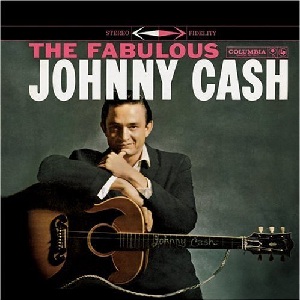Related Research Articles

Johnny Cash at San Quentin is the 31st overall album by Johnny Cash, recorded live at San Quentin State Prison on February 24, 1969, and released on June 16 of that same year. The concert was filmed by Granada Television, produced and directed by Michael Darlow. The album was the second in Cash's conceptual series of live prison albums that also included At Folsom Prison (1968), På Österåker (1973), and A Concert Behind Prison Walls (1976).

Rosanne Cash is an American singer-songwriter and author. She is the eldest daughter of country musician Johnny Cash and Vivian Liberto Cash Distin, Johnny Cash's first wife. Although she is often classified as a country artist, her music draws on many genres, including folk, pop, rock, blues, and most notably Americana. In the 1980s, she had a string of genre-crossing singles that entered both the country and pop charts, the most commercially successful being her 1981 breakthrough hit "Seven Year Ache", which topped the U.S. country singles chart and reached the Top 30 on the U.S. pop chart.

Jack Henderson Clement was an American singer, songwriter, and record and film producer.

Johnny Cash with His Hot and Blue Guitar! is the debut album by American recording artist Johnny Cash, released on October 11, 1957. The album contained four of his hit singles: "I Walk the Line," "Cry! Cry! Cry!," "So Doggone Lonesome," and "Folsom Prison Blues." It was re-issued on July 23, 2002, as an expanded edition, under the label Varèse Vintage, containing five bonus tracks, three being alternate versions of tracks already on the original LP. In 2012, Columbia Records reissued the album with 16 additional non-album Sun Records tracks as part of its 63-disc Johnny Cash: The Complete Columbia Album Collection box set. In 2017, 60 years after the original release, the album was remastered under the title Johnny Cash with His Hot and Blue Guitar! .

The Fabulous Johnny Cash is the second studio album by American country singer Johnny Cash and his first to be released by Columbia Records, marking the beginning of 28 years with the label. The album was released on November 3, 1958, not long after Cash's departure from Sun Records.

"Million Dollar Quartet" is a recording of an impromptu jam session involving Elvis Presley, Jerry Lee Lewis, Carl Perkins, and Johnny Cash made on December 4, 1956, at the Sun Record Studios in Memphis, Tennessee. An article about the session was published in the Memphis Press-Scimitar under the title "Million Dollar Quartet". The recording was first released in Europe in 1981 as The Million Dollar Quartet with 17 tracks. A few years later more tracks were discovered and released as The Complete Million Dollar Session. In 1990, the recordings were released in the United States as Elvis Presley - The Million Dollar Quartet. This session is considered a seminal moment in rock and roll.

The Essential Johnny Cash is a double-compact disc compilation by Johnny Cash released as part of Sony BMG's Essential series. It was compiled to commemorate Cash's 70th birthday. It is not to be confused with the three-CD box set of the same name released by Columbia Records in 1992.
"Cry! Cry! Cry!" is a song written and performed by singer/songwriter, Johnny Cash. The song was originally released in 1955 and reached number 14 on the Best Sellers charts.

Sings Hank Williams is a compilation album by American singer-songwriter Johnny Cash. It was released on September 5, 1960, by Sun Records after Cash had left the label and signed with Columbia Records. The album is made up of songs Cash recorded for Sun prior to leaving the label. The album was re-issued in 2003 by Varèse Sarabande with five bonus tracks, two of them being alternate recordings of songs already available on the album.

Happiness Is You is the 24th album by country singer Johnny Cash, released on Columbia Records in 1966. It contains, among others, "Guess Things Happen That Way", a re-recording of one of Cash's earliest Sun songs. The record reached #10 on the Country charts. The LP was originally to be titled "That's What You Get For Lovin' Me", taking its title from the Gordon Lightfoot tune included in the album, and promo copies and some early commercial pressings show this title on the label.

The Johnny Cash Sun Records discography details the music recorded by country music legend Johnny Cash and released on Sun Records. From late 1954 to July, 1958, Cash recorded for Sun Records, a label founded by Sam Phillips and located at Sun Studio in Memphis, Tennessee. Despite making his final recordings for Sun in 1958 and subsequently moving to Columbia Records, Phillips amassed sufficient backlog to continue to release new material by Cash in single and album format until as late as 1964.

"The Mercy Seat" is a song written by Nick Cave and Mick Harvey (music), originally performed by Nick Cave and the Bad Seeds on the 1988 album Tender Prey. The song has been covered by others, including Johnny Cash, Camille O'Sullivan and Unter Null. Rolling Stone editor Toby Creswell lists it as one of the 1001 greatest songs.

Walk a Mile in My Shoes: The Essential '70s Masters is a five-disc box set compilation of the recorded work of Elvis Presley during the decade of the 1970s. It was released in 1995 by RCA Records, catalog number 66670-2, following similar box sets that covered his musical output in the 1950s and 1960s. This set's initial long-box release included a set of collectable stamps duplicating the record jackets of the LP albums on which the tracks in the box set were originally released by RCA. It also includes a booklet with an extensive session list and discography, as well as a lengthy essay by Dave Marsh, some of it excerpted from his 1982 book on Presley. The box set was certified Gold by the Recording Industry Association of America on July 15, 1999.

John R. Cash was an American singer, songwriter, musician, and actor. Much of Cash's music contained themes of sorrow, moral tribulation, and redemption, especially in the later stages of his career. He was known for his deep, calm bass-baritone voice, the distinctive sound of his Tennessee Three backing band characterized by train-like chugging guitar rhythms, a rebelliousness coupled with an increasingly somber and humble demeanor, free prison concerts, and a trademark all-black stage wardrobe which earned him the nickname "The Man in Black".

Thomas Paulsley LaBeff, known as Sleepy LaBeef, was an American singer, musician and actor.

Let Me Tell You About a Song is the fourteenth studio album by American country singer Merle Haggard and The Strangers, released in 1972. It reached No. 7 on the Billboard Country album chart and #166 on the Pop album chart. The lead-off singles were "Grandma Harp" and "Daddy Frank " — both reached No. 1.

"Guess Things Happen That Way" is a 1958 cross over single by Johnny Cash, which was written by Jack Clement. The single was Johnny Cash's fourth #1 on the country chart spending eight weeks at #1, and a total of 24 weeks on the chart.
The Complete Columbia Album Collection is a box set by country singer Johnny Cash, released in 2012 on Columbia Records and Legacy Recordings.
"Give My Love to Rose" is a country song by Johnny Cash, which he recorded together with the Tennessee Two at Sun Records under the production of Sam Phillips in 1957. The song was released in August of the same year as the B-side of the single "Home of the Blues", which reached No. 3 in the Country Jockey charts and No. 5 in the Country & Western Chart. "Give My Love To Rose" reached No. 13 in the Country & Western Chart.
This is a list of Billboard magazine's ranking of the year's top country and western singles of 1958.
References
- ↑ John L. Smith The Johnny Cash Discography 1985 -- Page 9 "COME IN STRANGER (Johnny Cash) B - CR-3O1O4, SB-1O3 Note: Martin Hawkins indicates a double session was filed with the American Federation of Musicians by the Sun Company but can provide no further details."
- ↑ All Music Guide to Country: The Definitive Guide to Country Music Vladimir Bogdanov, Chris Woodstra, Stephen Thomas Erlewine - 2003 "The Essential Sun Singles - As great as Cash's Sun catalog was. it's been reissued on so many ... "I Walk the Line," "Ballad of a Teenage Queen," "Big River," "Guess Things Happen That Way," "Come in Stranger,"